In the wake of the Dutch election results of November 2023, political analysts have scrambled to understand how Geert Wilders, leader of the Dutch populist Party for Freedom (PVV), and his party managed to win the general elections. Embodying, what political analysts have dubbed a campaign-specific, milder alter-ego Geert Milders, Mr. Wilders managed to grow his party to 37 seats, a significant 20-seat increase, in the 150-seat House of Representatives. While Mr. Wilders was playing the part of the non-threatening uniter in the campaign with milder statesman-like rhetoric, the mediation of Geert Milders goes beyond his performance in debates.
For the kids’ news program, NOS Jeugdjournaal, Mr. Wilders’ campaign interview was conducted in a cat shelter. Squeezed in between the shots of adorable kittens, Mr. Wilders is allowed to say that practicing Islam should be prohibited in the Netherlands, and the country ought to limit accommodating asylum seekers. Mr. Wilders has been deploying this tactic for some years now, predominantly through an X account for his two cats. On the blue-certified account, Mr. Wilders posts seemingly apolitical images of his two adorable cats Noortje and Pluisje. The account features an image of the two cats wishing their followers a merry Christmas, edited in front of a Christmas tree with the fireplace on. Photoshopped with a skill level plenty first-year design students merely dream of, other images include happy Halloween wishes from the two in carved-out pumpkins, or the two cats wearing party hats celebrating Mr. Wilder’s 60th birthday. Despite political analysts having long dismissed it as a mere joke, I would suggest that Mr. Wilders’ cat social media account @Wilderspoezen has had an essential supporting act in the mediation of Geert Milders.
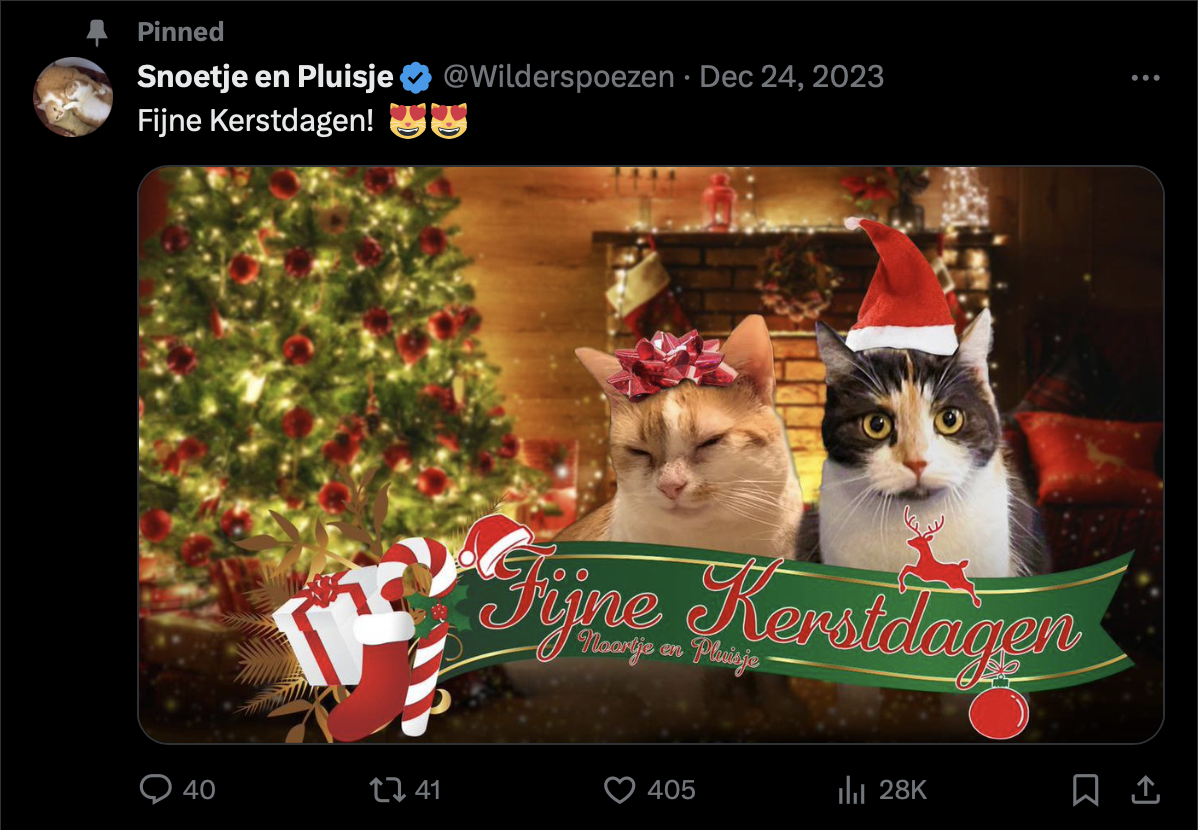
“Merry Christmas!” – Noortje and Pluisje wish their followers a Merry Christmas.
Cats in politics
While the PVV is in coalition negotiations attempting to lead the Netherlands into its post-Rutte era, in re-evaluation of Mr. Wilders’ cat social media account it seems worth looking beyond the absurdity of the internet, to understand its role in the rebranding Mr. Wilders’ public image. Obviously, the cats are not guilty of anything other than being cute bundles of fur. Perhaps that is where the problem lies. Their aesthetic is being weaponized to soften Mr. Wilders’ image. A move that speaks to the workings of contemporary populist politics.
In order to understand the role Mr. Wilders’ cat on X has played in his evolution into a ‘reliable’ statesman, we have to go back to the account’s early days. It is March 25, 2017, ten days after that year’s general election, when Mr. Wilders opens the – then – Twitter account for his beloved cats. Despite holding steady as the second biggest party in the House of Representatives, Mr. Wilders’ party was blocked from coalition negotiations by the incumbent PM, and leader of the then-biggest party, Mark Rutte. Five years after their failed attempt at collaboration, between 2010 and 2012, it became clear that Mr. Wilders’ only way to the cabinet was to win an election.
Within the Dutch political system, having the biggest party in parliament is not enough to get into power. Hung governments are the norm, with no party in recent history ever obtaining an absolute majority in the House of Representatives. Forming a government therefore relies heavily on compromise. Getting parties around the negotiation table requires some level of trust that the potential collaboration would be beneficial to each party. Voters know this and may take it into consideration at the polls: what parties will be able to work together?
Mr. Wilders had to seem like a trustworthy and beneficial collaborative partner. To do so, illustrated by the 2023 campaign and subsequent results, he had to appear to be more relatable. Public image is, arguably, more important in populism than other tactics of politics. When politics are based on a make-believe reality rather than facts, carefully curating that reality is imperative to electoral success. For Mr. Wilders to transform his image from someone who holds alienating, extreme and distasteful views, to someone of and working for ordinary people, he needed a vehicle. This is where the cat social media account comes in. The utilization of domesticated animals by populists to package their appalling rhetoric in an aesthetic layer of innocence and relatability, is what I call pawpulism.
Pawpulism feasts off the peculiar bond that humans have with domesticated animals. The care that we feel for our companions with paws, which is mainly brought about by their cute aesthetic, is a very powerful one. This discussion aims to describe the mechanics of pawpulism by investigating the effective weaponization of Mr. Wilders’ cute cats in the mediation of his milder public image. It will show that, within the political realm, the wielding of the cats is far from innocent.
Pawpulism and the cute
At the time of writing, the X account @Wilderspoezen has grown to 25.8 thousand followers. Visibly satisfied by his cats’ popularity, Mr. Wilders said in a 2023-campaign interview with right-wing newspaper de Telegraaf: “They have their own [X] account, with more followers than the average House member, I might add.” Mr. Wilders’ choice to make his cats a topic of conversation, in the middle of a hard-fought campaign, signifies his awareness of the electoral potential that the account holds. It serves as a way of reaching voters who have disengaged from the political debate but are amenable to digital content of cats.
When examining this content, it becomes increasingly clearer that Mr. Wilders is aware of this potential. Early content consisted primarily of unedited cat photos, with a quality that suggests they were phone-taken. Gradually, more edited photos make their appearance, with the quality of photoshopping increasing significantly. Where photoshopped images are mainly posted for bank holidays such as King’s Day, Easter, and Valentine’s Day, ‘candid’ cat pictures are uploaded more sporadically, resulting in approximately one post a month. Notably, apart from an accidental arm or hand, Mr. Wilders, nor any other human, ever makes an appearance in the cat content. The effacing of Mr. Wilders from content, together with the posts focused on holidays, suggest that the account is seemingly apolitical. However, posting schedule, careful content curation and efforts made on photo editing suggest a deeper investment by Mr. Wilders and his team. It, in fact, shows that the account is not just an internet account for his cats but an effective tool in the strategic arsenal of the PVV.
Arguably, @Wilderspoezen’s success can largely be attributed to the cats’ aesthetic qualities of being cute. Although not exclusive to their visual characteristics – Noortje and Pluisje’s names are diminutives of classic feline names, reinforcing a sense of endearment – analyzing the content might reveal the cats’ potential. Let’s turn to three candid images to understand the cuteness of Noortje and Pluisje. In the image below we see Noortje lying down. In this snug image, the framing plays a significant role in how we perceive the cat. The emphasis on Noortje’s head creates a distorted idea about her bodily proportions, facilitating the idea that her head is bigger than her body. The image highlights Noortje’s fluffy cheeks, little snout, and big relaxed eyes, resulting in cognitive dissonance with regard to the human idea of facial proportion.
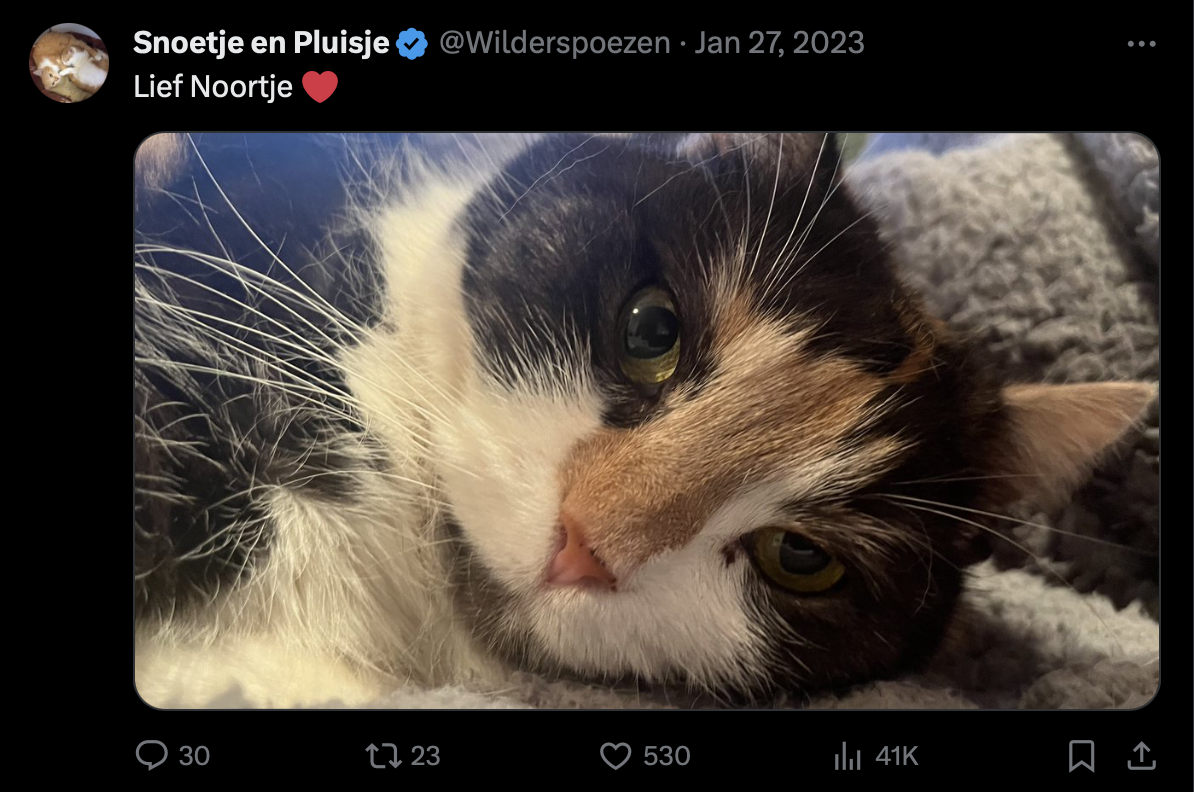
“Sweet Noortje.” – Noortje lying down.
The other two images, both part of the same post, show the cats in defenselessness positions – in this case sleeping, but there are others where we see them eating, and cuddling – be it with or without Mr. Wilders’ arm. In these particular photos, the cats are bundled up, without visible legs and paws. Contrasting the soft bedding, their even softer fur further enhances their amorphousness. The cats become furry balls of helplessness. These depictions oppose feline predatory nature, which neutralizes their aggressive potential, and elicit what zoologist Konrad Lorenz’ has theorized to be the ‘child schema’. Referring to human interactions with cubby babies, Lorenz asserted that aesthetic qualities that play with proportions – such as big eyes, big cheeks, little snout, big head, and tiny body – provoke a mode of care in the human observer.
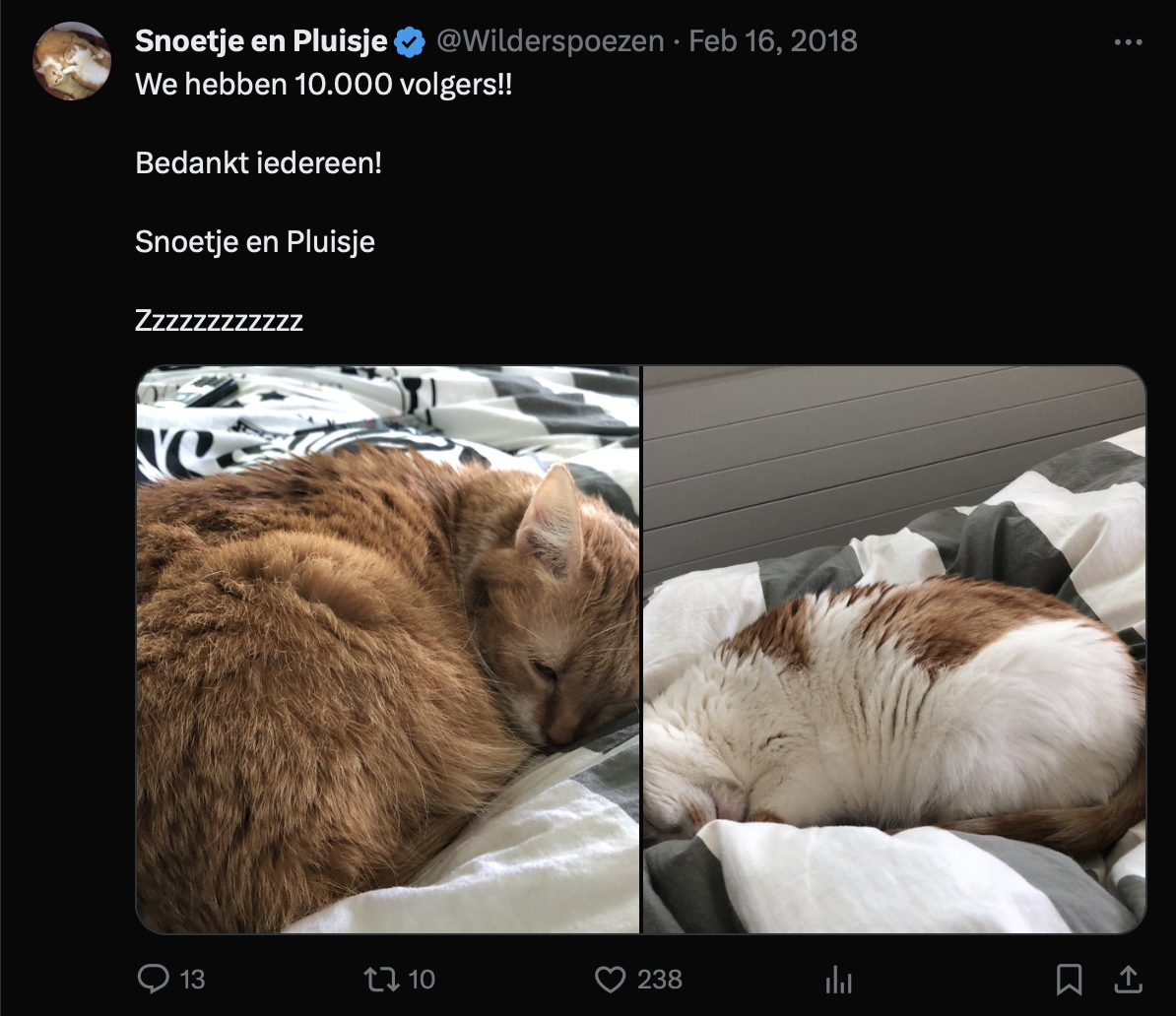
“We have 10.000 followers! Thanks to everyone! Snoetje and Pluisje Zzzzzzzzzz” – Snoetje and Pluisje take a nap.
According to Radha O’Meara, a lecturer in Media Studies at Massey University, analyses of cat content should happen not only on the level of imagery but also, and perhaps more importantly, with a focus on interspecies negotiations of power. The raw material, that the cute deals in, is this interspecies negotiation of power. As cultural theorist Sianne Ngai notes, the cute relies heavily on familial bonds. Cute objects are screaming: Take care of me, be my “mother”. Part of the helplessness evoked is rooted in the cat their lack of self-consciousness. Writing about cute cat videos on YouTube, O’Meara states: “Cat videos employ a unique mode of observation: we observe the cat, who is unencumbered by our scrutiny.” Cats’ oblivion to being watched makes them such powerful beacons of cuteness. To put it differently, if this self-consciousness existed, the feline-human interaction would not rely on a similar cry for help. Thinking about it this way, we could say that what makes a cat cute, is not limited to mere aesthetic qualities, but extends to a mode of dependency elicited by the cat.
Understanding Noortje and Pluisje’s relationship with their followers as one between subordinate object and dominant subject, becomes increasingly alarming when we shift our analysis to Mr. Wilders’ electoral base. 2023 PVV voters have voiced feelings of being neglected by the state. For some, these feelings of neglect may come with a search for control. And the cats ‘ask’ the aesthetic subject to be in this position of control. In the account’s followers’ interaction with the cats – instead of forgotten and dismissed – they may be placed in the position of power, albeit it subconsciously. The account may allow a group of, self-proclaimed, unheard voters to feel like they are acknowledged by the cats. Through their interaction with the cats, they are deemed worthy of being figures of care. In a demographic that has voiced a need for acknowledgement, @Wilderspoezen’s role in this search cannot be negated as a funny internet account.
Simultaneously, the potential voter gets pulled into the domestic sphere of Mr. Wilders. The imaginary parental status that the aesthetic subject subsequently achieves, brings the voter to a similar plane as Mr. Wilders. The voter becomes a different type of spectator. Rather than a subordinate of Mr. Wilders, they are seemingly on an equal footing. Despite his visual absence on the account, the cats allow Mr. Wilders to be framed as a loving and caring being, and fundamentally, a person of the “good” people. This man-of-the-people moment is exactly the make-believe equilibrium a populist politician would want to operate in.
Pawpulism thus uses the potential of the cute aesthetic, of our domesticated comrades, to put disavowed voters into a position of power. It bridges the distance between voter and politician, rendering the politician one of the people, and fundamentally one of the virtuous people. This reinforces the populist narrative of ‘us’ against ‘them’, with us being ‘the good people’ and them being the ruling class elite or the unknown migrant.
Pawpulism and the platform
Mr. Wilders’ cat account being located on X is no coincidence. In fact, pawpulism, as a subsidiary of populism, exists in symbiosis with online forums such as X. According to Nick Srnicek, in his book Platform Capitalism , with the decrease in production costs of data-collecting tools and the ever-increase of digital communications, the twenty-first century has seen companies shift business models with primary objective extraction and processing of data. Srnicek called these firms that moved to or were founded for data extraction: platforms. Twitter hosts a digital forum for discussion, concomitantly mining the user’s data with regards to any imaginable type of measurable content interaction. Advertising becomes the tool to valorize the user data into capital.
Any type of content that provokes a response that keeps us engaged on the platform is valuable in the platform’s economy. A 2015 study, by Jessica Gall Myrick, in which 6795 people were asked to watch videos of cats on X and Facebook, found that engagement in cat videos generally improves people’s moods. Reasonably, the tokenized cat content becomes fun to share and enjoyable to watch. On the platform, as the cats dutifully perform their cuteness, both the cats and the audience have become commodified. Being forms of revenue, it is imperative that X’s algorithm keeps presenting Noortje and Pluisje to anyone who the algorithm might think enjoys cat content.
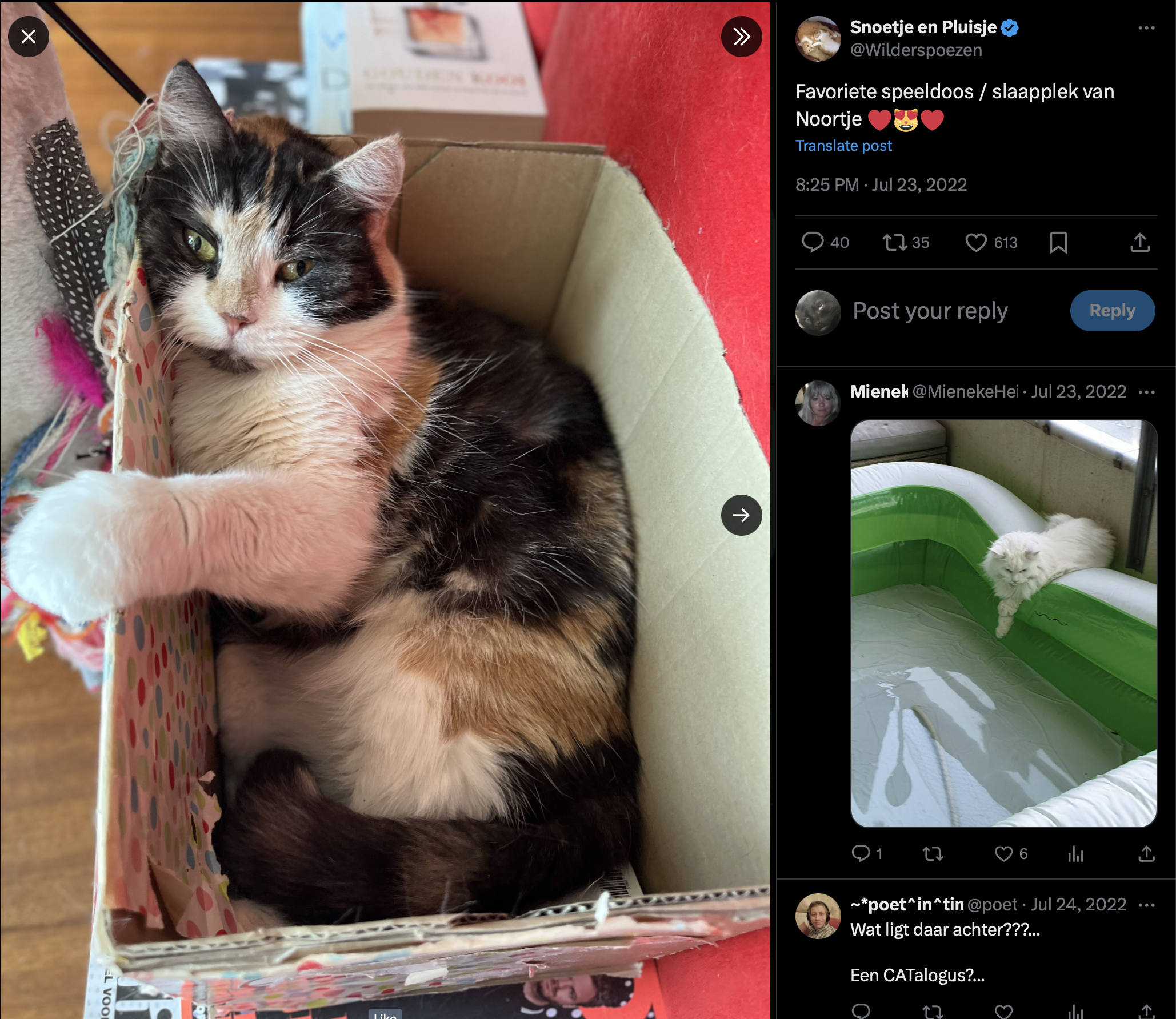
“Noortje’s favorite play box/sleeping” – @Wilderspoezen and two responses that posts receive.
More importantly, one of Mr. Wilders’ talking points has been “dishonest, inaccurate, and fake media,” which has resulted in him requiring a media outlet that lets him directly connect to his voter base. In the wake of Elon Musk’s takeover of X, supervision on the sharing of factual information has increasingly been rolled back on the platform. This results in a digital scape where Mr. Wilders is able to reach his constituents uncensored.
Mr. Wilders’ followers are treated on a cocktail of xenophobic, climate change denialist and racist statements, sweetened with some feline cuteness. On the same day, voters following both Mr. Wilders and his cats receive an array of hateful posts such as this one:
“Asylum profiteers are not allowed to be sent back to Italy, car owners are paying more for petrol and diesel, and you will receive a Royal decoration for destroying Dutch culture. The Netherlands of Rutte and Kaag in a nutshell: national self-loathing.”
A bit further down the feed – past the post advocating for more restrictive legislation targeting Islam – voters find Mr. Wilders’ trusted companions chilling it out on the couch. Subsequently, the cuteness of Noortje and Pluisje is weaponized as a negator of the harsh and combative language that Mr. Wilders uses on the platform.
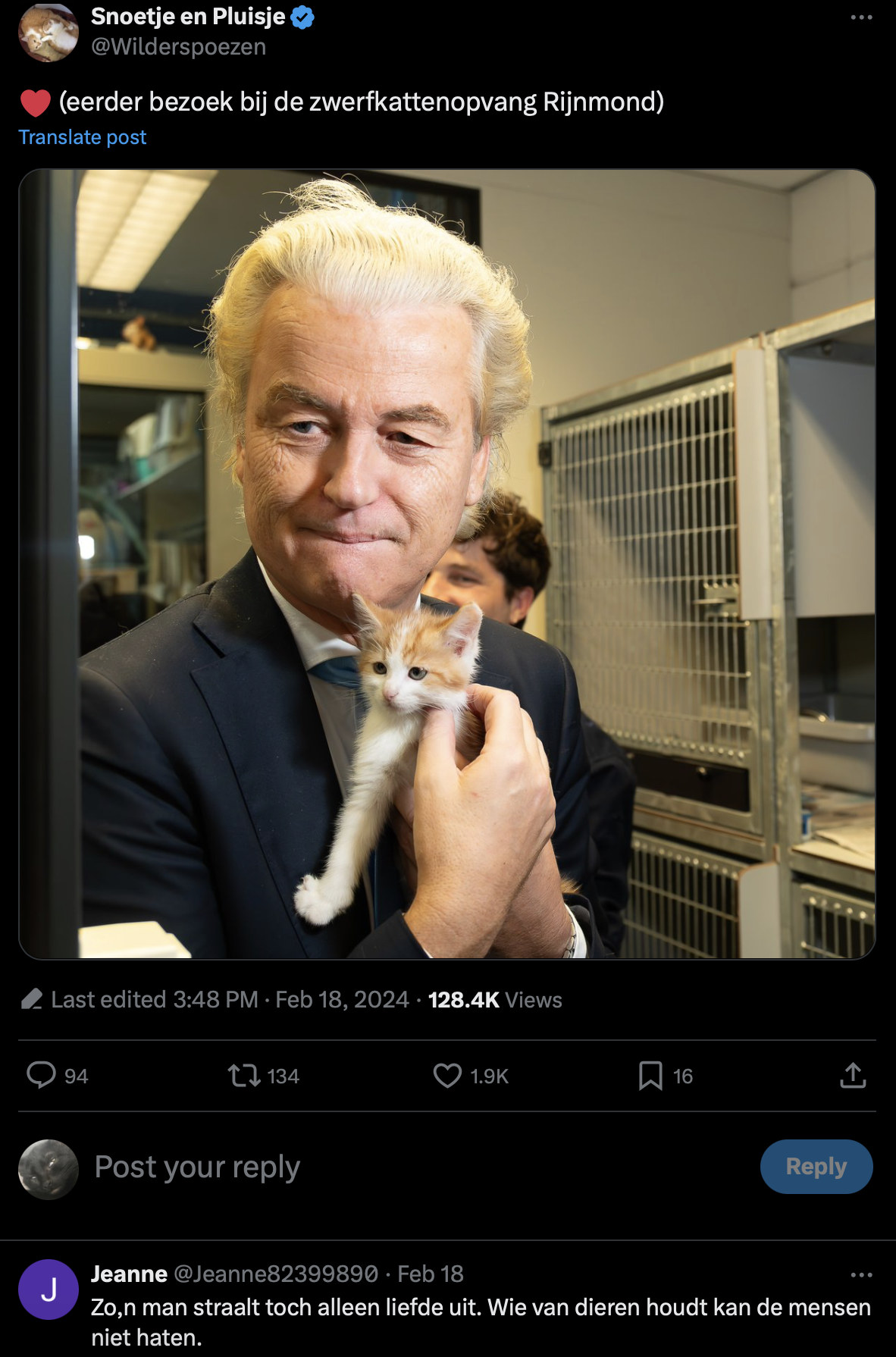
Pawpulism in action. @Wilderspoezen posts “<3 (earlier visit to stray cats shelter Rijnmond)”, @Jeanne82399890 replies “A man like this only radiates love. Those who love animals cannot hate people.” Jeanne’s account appears not to be a bot or troll.
How could Mr. Wilders mean any harm?
The utilization of animals for political gain has been tried and tested, exemplified by the Nazi’s animal welfare program, and, more recently, ISIS worriers posing with cute kittens on X. Argentinian president Javier Milei has also understood the assignment, stopping his inaugural procession to pat a golden retriever. The term pawpulism describes these tactics employed by political figures to weaponize domestic animals, as a means of presenting themselves in a more relatable and innocent light.
Pawpulism holds key potential in a political landscape that is characterized by a group of working-class voters who have disengaged from politics. Through the likes of Noortje and Pluisje, Mr. Wilders not only connects with disengaged voters but also positions himself as their equal. Simultaneously, pawpulism fosters a narrative that associates affection for animals with benevolence towards humanity, negating the inciting character of Mr. Wilders’ speech.
Henk Bovekerk’s claim that “the PVV is an affair more of the gut than of the brain, with no philosophical underpinnings”, underscores how pawpulism seamlessly aligns with the mechanics of the PVV. People react to the cute images purely on a primal instinct, which then blunts the critical capacity to substantially evaluate Mr. Wilders’ hateful rhetoric. Pawpulism subsequently and covertly pulls a populist preacher of fascist ideology into a familiar and quotidian realm and renders voting for him a normalized activity. Amongst the big furry cheeks, it is difficult to see the hate.
—
Frank D. van Beek is a designer based in Rotterdam. Their recent works explores projections of right-wing populism on cultural phenomena, through writing, graphic design and performance. They are currently pursuing a Master in Fine Arts in The Critical Inquiry Lab at Design Academy Eindhoven.
—
Bibliography
Arluke, Arnold, and Boria Sax. “Understanding Nazi Animal Protection and the Holocaust.” Anthrozoos 5, no. 1 (March 1, 1992): 6–31. https://doi.org/10.2752/089279392787011638.
Bovekerk, Henk. “Prototypical Fascism in Contemporary Dutch Politics.” BA Thesis, Tilburg University, 2011. https://legacy.gscdn.nl/archives/images/henkiespermatankie.pdf.
Dale, Joshua Paul, Joyce Goggin, Julia Leyda, Anthony P. McIntyre, and Diane Negra. The Aesthetics and Affects of Cuteness. Routledge, 2016.
Galston, William. “The Populist Challenge to Liberal Democracy.” Journal of Democracy 29, no. 2 (December 7, 2023): 5–19. https://www.journalofdemocracy.org/articles/the-populist-challenge-to-liberal-democracy/.
Geelen, Jan-Pierre. “Als De Kat Van Huis Is, Dansen Er Steeds Minder Muizen.” De Volkskrant. December 1, 2023. Accessed December 17, 2023. https://www.volkskrant.nl/columns-van-de-dag/als-de-kat-van-huis-is-dansen-er-steeds-minder-muizen~b624b304/.
“Geert Wilders Openhartig Over Zijn Katten: ‘Hebben Ze Moeten Scheiden.’” Telegraaf, November 13, 2023. Accessed December 17, 2023. https://www.telegraaf.nl/video/469957494/geert-wilders-openhartig-over-zijn-katten-hebben-ze-moeten-scheiden.
Griend, Robert van de. “Dieren Zijn Ongeveer Het Enige Wat Dit Compleet Overspannen Land Nog Een Beetje Bij Elkaar Houdt.” De Volkskrant. July 26, 2018. Accessed December 17, 2023. https://www.volkskrant.nl/columns-opinie/dieren-zijn-ongeveer-het-enige-wat-dit-compleet-overspannen-land-nog-een-beetje-bij-elkaar-houdt~b0437bac/.
Hameleers, Michael. “Populist Disinformation: Exploring Intersections Between Online Populism and Disinformation in the US and the Netherlands.” Politics and Governance 8, no. 1 (March 5, 2020): 146–57. https://doi.org/10.17645/pag.v8i1.2478.
Jeanne, [@Jeanne82399890]. “Zo,N Man Straalt Toch Alleen Liefde Uit. Wie Van Dieren Houdt Kan De Mensen Niet Haten.” X (Twitter), February 18, 2024. Accessed February 23, 2024. https://twitter.com/Jeanne82399890/status/1759231323573518744.
Johnson, Bethan. “The Role of Animals in National Socialist Propaganda.” Fair Observer, January 10, 2022. Accessed December 17, 2023. https://www.fairobserver.com/region/europe/bethan-johnson-national-socialism-nazi-propaganda-adolf-hitler-animals-germany-history-82393/#.
Jones, Jonathan. “Why Populists Adore Cats – and Use Them in Their Political Propaganda.” The Guardian, October 19, 2022. Accessed December 17, 2023. https://www.theguardian.com/artanddesign/shortcuts/2018/nov/27/why-populists-adore-cats-and-use-them-in-their-political-propaganda.
Lührmann, Anna, Juraj Medzihorsky, and Staffan Lindberg. “Walking the Talk: How to Identify Anti-Pluralist Parties.” The Varieties of Democracy Institute, 2021. Accessed February 9, 2024. https://v-dem.net/media/publications/working_paper_116_final.pdf.
Myrick, Jessica Gall. “Emotion Regulation, Procrastination, and Watching Cat Videos Online: Who Watches Internet Cats, Why, and to What Effect?” Computers in Human Behavior 52 (November 1, 2015): 168–76. https://doi.org/10.1016/j.chb.2015.06.001.
Ngai, Sianne. Our Aesthetic Categories: Zany, Cute, Interesting. Harvard University Press, 2012.
NOS Jeugdjournaal. “Katten Knuffelen Met Geert Wilders (PVV),” November 9, 2023. Accessed December 17, 2023. https://jeugdjournaal.nl/artikel/2497217-katten-knuffelen-met-geert-wilders-pvv.
O’Meara, Radha. “Do Cats Know They Rule YouTube? Surveillance and the Pleasures of Cat Videos.” M/C Journal 17, no. 2 (March 10, 2014). https://doi.org/10.5204/mcj.794.
Oostveen, Magriet. “Nieuw Onderzoek Toont Aan: Flitswinst PVV Kwam Voort Uit Eigen-volk-eerst-gevoel.” De Volkskrant, December 21, 2023. Accessed January 13, 2024.
https://www.volkskrant.nl/binnenland/nieuw-onderzoek-toont-aan-flitswinst-pvv-kwam-voort-uit-eigen-volk-eerst-gevoel~bb864eee/.
Righton, Natalie. “Wilders Zet Islamverbod En Andere Omstreden Plannen Formeel in De Ijskast.” De Volkskrant, January 8, 2024. Accessed January 13, 2024.
https://www.volkskrant.nl/politiek/wilders-zet-islamverbod-en-andere-omstreden-plannen-formeel-in-de-ijskast~bd677c3a/.
Schipper, Nienke. “Extreemrechts Lijkt Op Sociale Media Op Een Gezellig Clubje.” Trouw. December 1, 2023. Accessed December 17, 2023. https://www.trouw.nl/cultuur-media/extreemrechts-lijkt-op-sociale-media-een-gezellig-clubje~b7822aeb/.
Sigal, Lucila. “Argentina’s Dog-loving President Milei Greets Canine Fan After Inauguration.” Reuters. December 10, 2023. Accessed February 19, 2024.
https://www.reuters.com/world/americas/argentinas-dog-loving-president-milei-greets-canine-fan-after-inauguration-2023-12-10/.
Spröer, Susanne. “Hitler’s Dogs: The Nazis and Their Pets.” Dw.Com, June 9, 2020. https://www.dw.com/en/hitlers-dogs-g%C3%B6rings-lions-how-the-nazis-used-and-abused-animals/a-53698708.
Srnicek, Nick. Platform Capitalism. John Wiley & Sons, 2016.
———. “The Challenges of Platform Capitalism: Understanding the Logic of a New Business Model.” IPPR, September 21, 2017. Accessed January 15, 2024. https://www.ippr.org/juncture-item/the-challenges-of-platform-capitalism.
Van De Keuken, Teun. “Lachend Hadden Ze Het Over Geert Milders. Jongens, Wat Een Grap! De Nihilistische Leegte.” De Volkskrant, November 26, 2023. Accessed January 26, 2024. https://www.volkskrant.nl/columns-opinie/lachend-hadden-ze-het-over-geert-milders-jongens-wat-een-grap-de-nihilistische-leegte~b14b467f/.
Vincent, James. “‘I Can Haz Islamic State Plz’: Isis Propaganda on Twitter Turns to Kittens and Lolspeak.” The Independent, August 21, 2014. Accessed December 17, 2023. https://www.independent.co.uk/tech/isis-propaganda-on-twitter-turns-to-kittens-and-lolspeak-i-can-haz-islamic-state-plz-9683736.html.
Wilders, Geert, [@Geertwilderspvv]. “Asielprofiteurs Mogen Niet Terug Gestuurd Worden Naar Italië, Automobilisten Gaan Meer Betalen Voor Benzine En Diesel En Voor Het Kapotmaken Van De Nederlandse Cultuur Krijg Je Een Koninklijke Onderscheiding. Het Nederland Van Rutte En Kaag in Een Notendop: Nationale Zelfhaat.” X (Twitter), April 26, 2023. Accessed February 19, 2024. https://twitter.com/geertwilderspvv/status/1651208619206008832.
Wilders, Geert, [@Wilderspoezen]. “Snoetje En Pluisje.” X (Twitter). Accessed January 13, 2024. https://twitter.com/wilderspoezen.
———. “Wij Wensen Alle Katten Van Nederland Een Geweldig 2023! Pluisje 😻 En Noortje 😻 (En We Missen Snoetje ✝︎).” X (Twitter), December 31, 2022. Accessed January 14, 2024. https://twitter.com/Wilderspoezen/status/1609174744766496768.
Parlement.com. “Zetelverdeling Tweede Kamer,” 2023. Accessed January 15, 2024. https://www.parlement.com/id/vh8lnhronvx6/zetelverdeling_tweede_kamer.
Image credits
In order of appearance:
Credits: @Wilderspoezen, December 24 2023, https://twitter.com/Wilderspoezen/status/1738822055338954808
Caption: “Merry Christmas!” – Noortje and Pluisje wish their followers a Merry Christmas.
Credits: @Wilderspoezen, January 23 2023, https://twitter.com/Wilderspoezen/status/1619065456882774017
Caption: “Sweet Noortje.” – Noortje lying down.
Credits: @Wilderspoezen, February 16 2018, https://twitter.com/Wilderspoezen/status/964615480303587329
Caption: “We have 10.000 followers! Thanks to everyone! Snoetje and Pluisje Zzzzzzzzzz” – Snoetje and Pluisje take a nap.
Credits: @Wilderspoezen, July 23 2022, https://twitter.com/Wilderspoezen/status/1550909922602254337/photo/1
Caption: “Noortje’s favorite play box/sleeping” – @Wilderspoezen and two responses that posts receive.
Credits: @Wilderspoezen, February 18 2024, https://twitter.com/Wilderspoezen/status/1759228296645009806
Caption: Pawpulism in action. @Wilderspoezen posts “<3 (earlier visit to stray cats shelter Rijnmond)”, @Jeanne82399890 replies “A man like this only radiates love. Those who love animals cannot hate people.” Jeanne account appears not to be a bot or troll.


